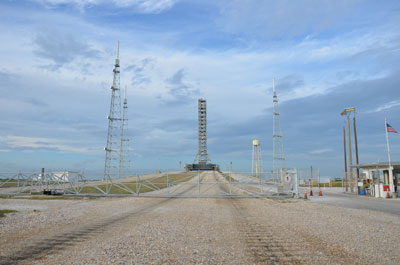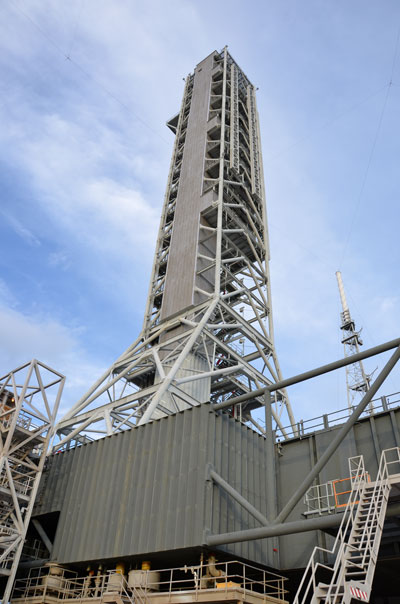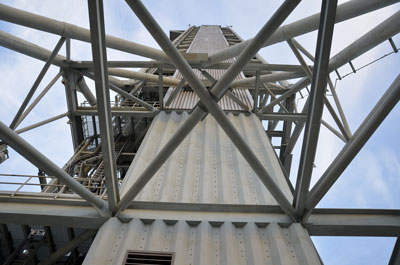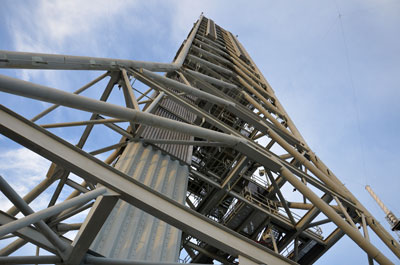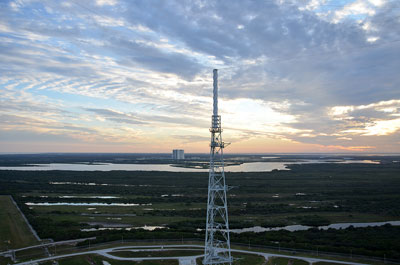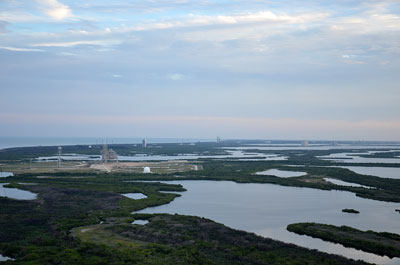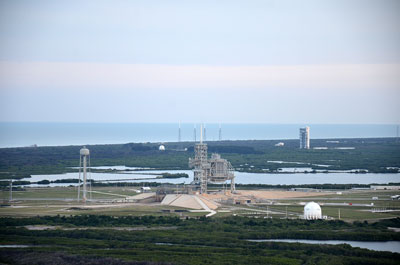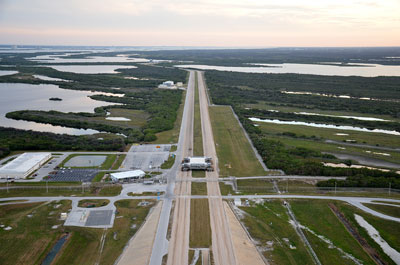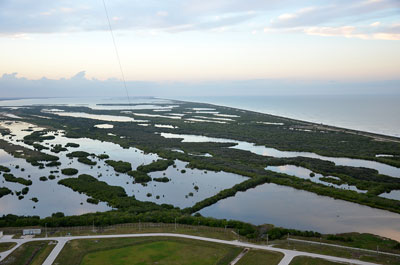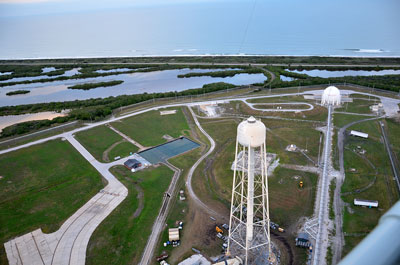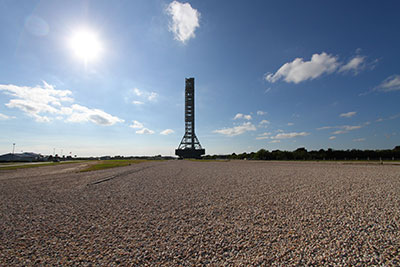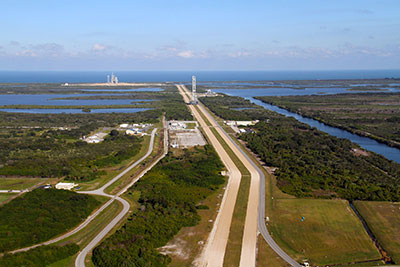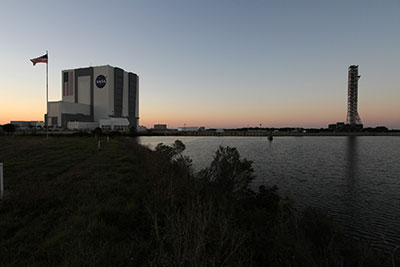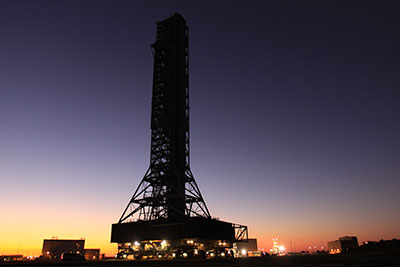 Space News space history and artifacts articles Messages space history discussion forums Sightings worldwide astronaut appearances Resources selected space history documents |
If you have previously registered, but forgotten your password, click here.
In anticipation of launching the Space Launch System (SLS) later this decade, engineers wanted to check the mobile launcher, or ML, in a number of categories ranging from how it would behave moving atop a crawler-transporter to how well its systems mesh with the existing infrastructure at Pad 39B, which has undergone renovations during the past year. "We have the time and will be able to gain significant knowledge that will assist in the development of the ML," Larry Schultz, ML project manager, said. The ML began its 14-hour move at 8:15 a.m. CST (1415 GMT) on Nov. 16. The trip covered about 4.2 miles from a work site beside the Vehicle Assembly Building to the launch pad. 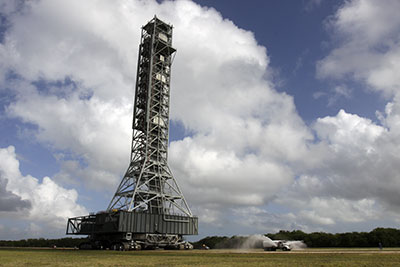 Credit: NASA/Kim Shiflett Rising 400 feet above the rocky crawlerway, the mobile launcher is substantially different than the mobile launcher platforms that carried space shuttles to the launch pads for 30 years. The dominant feature is the ML's tower, a 345-foot-high gray, steel tower reminiscent of the ones that serviced the Saturn rockets in the 1960s and 70s. Not since 1975 has a structure as tall as the ML stood at either of Kennedy's launch pads. The mobile launcher had been moved once before, but not very far. It was repositioned at its worksite beside the Vehicle Assembly Building in October 2010. Although it was originally erected to host a slim rocket, the structure's design was flexible enough that it can be modified to support the Space Launch System, a rocket that is in the same lifting category as the Saturn V. The modifications to come include strengthening the supports in the base and widening the exhaust port the rocket will stand over. The ML's exhaust port now is a 22-foot square. It will be made into a 60-foot-by-30-foot rectangle. Swing arms will be added in the 2015 timeframe, modified to provide fueling and venting along with electrical and communication links to the different stages of the booster, along with a crew access arm reaching out to NASA's Orion multi-purpose crew vehicle (MPCV) at the top. Even with the modifications, the structure will be lighter than the shuttle's mobile launcher platform. The tower was built atop a 47-foot-tall base of steel that is 165 feet long and 135 feet wide. Altogether, the ML weighs in at 6.75 million pounds. The tower's destination for the move was Launch Pad 39B, which has undergone its own staged makeover since it last hosted a space shuttle. The tower that stood at the pad, which was specifically built for the shuttle, was removed recently and workers refurbished the pad complex's network of lines and plumbing. The tests of the ML will see whether any of the support fittings at the pad need to be realigned, while also assessing future needs for the pad to permit the ML to perform its work of preparation and launch. The launch pad still has needed modifications, including a likely redesign of the flame deflector and refurbishment of the flame trench. Unlike other pad designs at Kennedy, Pad 39B is envisioned to have a flexible concept so it can host several kinds of rockets, including the SLS and commercial boosters and spacecraft. 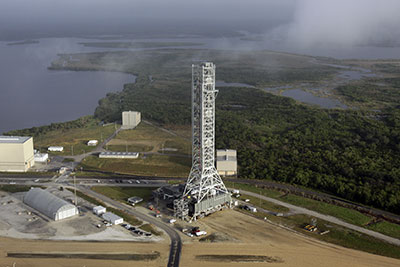 Credit: NASA/Kim Shiflett After two weeks at 39B, the ML will be moved back to its worksite. Many of the structures that will be added to the ML will see their designs tested at Kennedy first at the Launch Equipment Test Facility. The lab is built so full-size segments of ground support equipment can be evaluated under realistic conditions. Once the ML has been outfitted with its arms and other modifications are completed, it will be taken again to the pad for more testing. The ML will carry an SLS to the pad in 2017, ahead of the rocket's first test mission. That unmanned flight is intended to evaluate the design before the rocket and spacecraft are used to take astronauts to deep space. 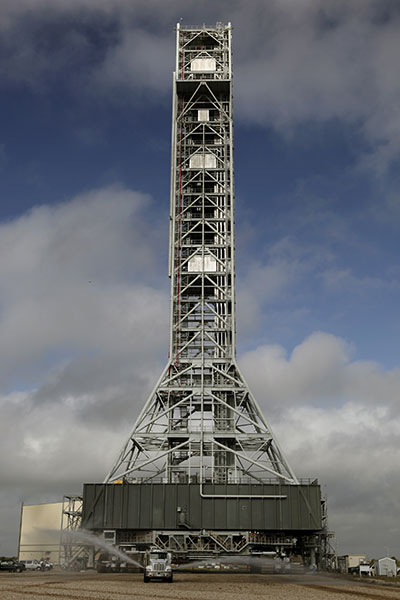 Credit: NASA/Dimitri Gerondidakis | ||||||||
| Robert Pearlman | collectSPACE photos Mobile Launcher (ML) on Pad 39B | |||||||
| Robert Pearlman | collectSPACE photos Views from atop the Mobile Launcher on Pad 39B | |||||||
| Robert Pearlman | collectSPACE photos Views from atop the Mobile Launcher on Pad 39B | |||||||
| Robert Pearlman | Mobile Launcher returns from Pad 39B 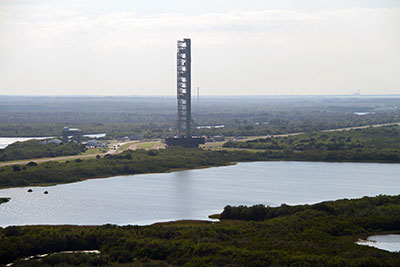
See here for discussion of NASA's mobile launcher (ML) development. | |||||||

